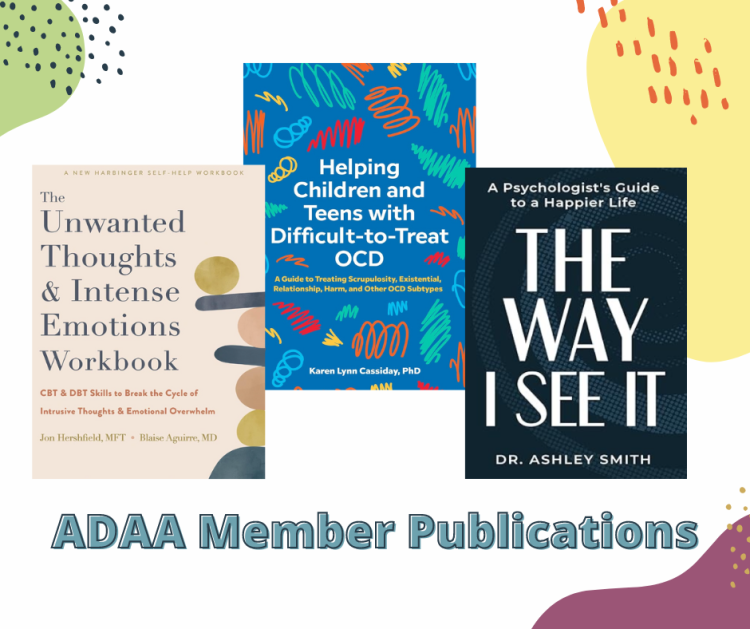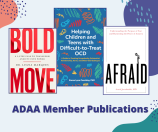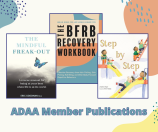ADAA Member Book Blogs
ADAA Member Book Blogs

Every quarter ADAA interviews three members for a blog that showcases new books by our esteemed experts. Our series – “In Conversation With ADAA Member Authors” – is a wonderful way to highlight our members' expertise and provide not only a brief synopsis of their books' focus areas but gives members a chance to relay in their own words what’s special or important about their respective publication(s).
We hope you will take advantage of this special member benefit and let us know if you would like to highlight a new book in a future blog by reaching out to [email protected]. And please read and enjoy previous quarterly blogs featuring ADAA’s members’ books and expertise:
Learn more about panic disorders, agoraphobia, and anxiety in both children and adults in our winter 2025 member book blog, featuring: Panic Disorder and Agoraphobia (Vol 55) - Advances in Psychotherapy Evidence-Based Practice by Simon Rego, PsyD, ABPP, A-CBT, The Anxiety Busting Workbook for Kids: Fun CBT Activities to Squash Your Fears and Worries by Debra Kissen, PhD, MHSA, and This is What Anxiety Looks Like: Relatable Stories, Targeted Solutions, and CBT Skills for Lasting Relief by David A. Clark, PhD.
Discover more about obsessions and compulsions, eating disorders and intrusive thoughts from ADAA member author books in our fall 2024 blog, featuring; Comorbid Eating Disorders and Obsessive-Compulsive Disorder: A Clinician's Guide to Challenges in Treatment by Jenna DiLossi, PsyD, ABPP and Melissa Harrison, MA, LPC, The Compulsive Reassurance Seeking Workbook: CBT Skills to Help You Live with Confidence and Break the Cycle of Obsessive-Compulsive Disorder by Amanda Petrik-Gardner, LCPC, and Hello Baby, Goodbye Intrusive Thoughts: Stop the Spiral of Anxiety and OCD to Reclaim Wellness on Your Motherhood Journey by Jenny Yip, PsyD, ABPP
Learn about happiness, self-awareness, and resilience from ADAA member author books in our summer 2024 blog, featuring; The Way I See It by Ashley Smith, PhD, When a Loved One Won’t Seek Mental Health Treatment by Melanie VanDyke, PhD, and C. Alec Pollard, PhD, and The Stoicism Workbook by R. Trent Codd, III, EdS, and Scott Waltman, PsyD, ABPP.
Mindful freak-outs, recovery from body-focused repetitive behaviors (BFRBs) and a children’s book on dealing with childhood anxiety are the subjects for this spring 2024 blog featuring: The Mindful Freak-Out by Eric Goodman, PhD, Step by Step by Kathryn Boger, PhD, ABPP, and The BFRB Recovery Workbook by Marla Deibler, PsyD, ABPP and Renae Reinardy, PsyD.
Mental health fitness and exercise of the mind are just as important as physical and body strength. Read how these member books show us that emotional fitness, winning the mental game and exercising a sensible treatment balance can help: The Unwanted Thoughts & Intense Emotions Workbook by Jon Hershfield, MFT, Courage Over Confidence by Mitchell Greene, PhD, and Making Meaning of Difficult Experiences by Sheila Rauch, PhD, and Barbara Rothbaum, PhD.
Anxiety in teens, social anxiety, and nine tools to actually thrive with anxiety give this member books blog useful skills, professional help and practical advice for those struggling with different types of anxiety: The Action Mindset Workbook for Teens by Mary Karapetian Alvord, PhD, CBT for Social Anxiety by Stefan Hofmann, PhD, and Thriving with Anxiety by David H. Rosmarin, PhD.
Fear is a part of life. But fear often takes over and causes debilitating anxiety, avoidance, and even obsessive-compulsive behaviors. In this blog, three member books help us put fear into perspective, transform anxiety into power and address challenging OCD subtypes in youth: Afraid by Arash Javanbakht, MD, Bold Move by Luana Marques, PhD, and Helping Children & Teens with Difficult-to-Treat OCD by Karen Cassiday, PhD, ACT.



















